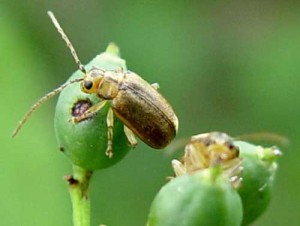 |
Heather Callaghan
Activist Post
Note: This article highlights another angle of the anti-organic folks.
“I hate organic,” Dr. Scott Merrel says. He’s an insect ecologist who recently spoke on a podcast with Miller McCune news site. He believes the main threat to our food supply is not so much the out of control pests, but the emphasis on growing organic.
“Your trip to Whole Foods might be part of the problem,” is how the show is introduced. Merrel does eat organic, but it’s a pet peeve and apparently the biggest threat to the entire food supply.
The Russian wheat aphid invaded the US in the ’80s, and deeply affected the wheat and barley fields. But he attributes it to wiping out the whole industry?
He focuses a lot on the aphids and adds that they do not survive extreme heat and cold. It is true, these aphids are particularly pesky as they are born pregnant. There are other insects that mow down the wheat too.
But why is organic the problem?
 |
| ad |
To him, organic is standing in the way of crucial pest management. He believes in stacking and alternating many different tactics to effectively combat the bug plagues. Some of those methods include rotating crops, delaying, genetically modified resistant crops, and pesticides.
He holds there are misconceptions about the perceived reduction of pesticides when we eat organic. He describes organic pesticides called pyrethrums that organic growers are allowed to use. These are less effective in his view and hypothetically will lead to resistance. Pyrethrums are natural compounds from chrysanthemums and are not harmful to mammals unless exposed to high doses or inhaled.
With the pest and resistance threat, Merrell makes it sound as though all techniques are futile. Okay, so pesticides don’t work, but we need them? He swears by the Integrated Pest Management (IPM) technique of stacking the variety of methods; a sort of a ‘better safe than sorry’ approach.
He’d rather see an IPM label versus organic. That label may reassure the consumer that every method possible was used to ensure more crops and pest control, but does little to ensure the quality of the food itself.
It is true that organic farmers are able to use low level toxicity pesticides like pyrethrums. Unfortunately, they can harm the beneficial insects (and fish too).
But those aren’t the only methods organic growers use. To suggest that organic is reckless and that vulnerable just isn’t fair. Organic farming is on the rise, and not because the crops are being wiped out by insects.
Some use neem pesticide derived from the India neem tree which has been in use for 4,000 years. Another method of growing utilizes companionship plants; strategically growing different varieties next to each other for the best defense. Anyone who has grown their own has most likely heard of the book Carrots Love Tomatoes by Louise Riotte. An Amazon search for organic pest control brings up hundreds of results.
Shouldn’t we also look at where the pest problem is coming from? It is hard for farmers to keep up with them. Isn’t it plausible that the amount of importing we do introduces us to these breeds?
And what of the rash of this summer’s super weeds that are more noted for ravaging crops? Thanks to Monsanto, farmers who already spent a pretty penny on the seed and heavy doses of RoundUp had to hire more workers and buy more equipment to battle the weeds. Much of the farming industry actually regressed to agrarian methods just to salvage what was left.
What about the super rootworm beetles that are now resistant to GM Bt-corn which led to major crop destruction? In response, Monsanto urged more IPM, but GM crops are already a heavy duty form of pest management. Ag Professional’s Colleen Scherer explained that “the Cry3Bb1 toxin is the major one deployed against rootworms. There is no ‘putting the genie back in the bottle,’ and resistance in these areas is a problem that won’t go away.”
Did you know there are ways of employing IPM without the use of GMOs and chemicals? Sepp Holzer is one man who authored a practical guide to integrative farming and gardening with alternative methods. There is no reason we have to spend millions on research, alter the ecology through GMOs, and foot the bill for expensive damage control just to eat. Organic is just one more natural method of adaptation which poses no threat to posterity’s stomachs, as long as it’s available.
Dr. Scott Merrell probably has good intentions for preserving the food supply, viewing it through the lens of raving bug plagues, a definite issue. So he doesn’t want pesticides to go away. Maybe some view it as a safety net, but how safe is it when it taints the very food we eat and threatens to harm us?
Many environmental experts are warning about the use of pesticides destroying the disappearing bee colonies. A much greater travesty to our food supply than the popularity of growing organic.
Organic growers and supporters, however, are just as concerned about these issues. That’s why they are protecting the food supply by saving seeds, keeping crops from GMO adulteration, decreasing pest resistance, and reducing the amount of pesticides in the environment and on the dinner plate.
Sources for this story:
https://www.activistpost.com/2011/08/monsanto-gm-corn-in-peril-beetle.html
http://www.miller-mccune.com/curiouser/could-organic-farming-threaten-our-food-supply-34734/
http://www.coopext.colostate.edu/4dmg/VegFruit/organic.htm
http://planetgreen.discovery.com/home-garden/green-pyrethrum-organic-control.html
http://www.chelseagreen.com/bookstore/item/sepp_holzers_permaculture/
var linkwithin_site_id = 557381;
linkwithin_text=’Related Articles:’



Be the first to comment on "Scientist Claims Organic Ag is the Real Threat to Food Supply"